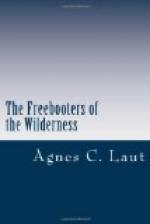The garrulous babble continued to the very doors of the Mission School, and through the formalities of an absurdly formal introduction to Mrs. Williams, and during the suppertime meal with the little Indian children in the big dining room. Eleanor noticed how Lizzie’s lips pursed with contempt at the other children and the little stomach poked out with arrogance and fulness as the boasting waxed.
“That kind is the most hopeless of all,” remarked Mrs. Williams in a low voice, amused at the amazement on the faces of the Indian children.
Yet Eleanor was glad. The babble gave her opportunity for withdrawal in her own thoughts; and when she came back to the Ranch House with Matthews, leaving Lizzie still boasting at the School, she hardly noticed that her father stopped the frontiersman on the threshold, but she passed out to the steamer chair on her own piazza. What was It? Eleanor could not have answered if she had tried. She only knew that she had drunk of the fulness of living, and that time could not rob her of that consciousness. It was there, forever with her, breathing in every breath, pulsing in the rhythm of her blood, “Closer than hands or feet,” as the Pantheistic poet has sung, immanent, enveloping, possessory, obsessory, warm, living, a flooding realization of life, giving tone to every touch of existence, like the strings of the violin to the bow of the skilled musician. She wanted to sing; the long, low, jubilant chant of womanhood which no poet has yet sung. By the joy of it, she knew what the sorrow of it must be. By the purity, she realized what the poisoning of the fountain springs of life could mean. By the triumph, she realized what the defeat, the debasement could be. She thought of love as a fountain spring, a spring into which you could not both cast defilement and drink of waters undefiled; as an altar flame fed with incense lighting the darkness; and one could no more offend love with impurity, than cast the dung heap on the altar flame and not expect blastment. She wanted to clap her hands as the gay, twinkling cottonwoods were clapping theirs to the sunset; to dance and beat gypsy tambourines as the pines were throbbing and harping and clicking to the age-old melodies of Pan. She wanted—what was it? Had the Israelitish women of old timed their joy to the rhythm of the dance; or was it a later strain, the strain from the tribal woman of the plains who heard a voice in the music of the laughing leaves, and the throb of the river, and the shout of the sun-glinted cataract, and the little lispings and whisperings of the waves among the reeds? The stars came pricking out. Each hung a tiny censer flame to the altar of night and holiness and mystery. She knew she could never again see the stars come pricking through the purple dusk without feeling the stab of joy that had wakened death to life when recognition had struck fire in consciousness. She knew, then, there was no eternity long enough for the joy of It, nor heaven high enough for the reach of It, nor hell deep enough for the wrong of It.




